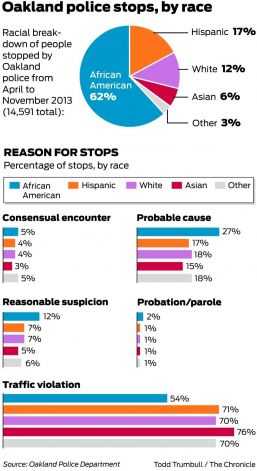Blacks Stopped More Often in Oakland, Data Show
Will Kane, San Francisco Chronicle, March 25, 2014
Nearly two-thirds of the stops made by Oakland police between April and December last year involved black people, according to data released Monday by the city in an effort to make policing practices more transparent.
Of the 14,591 stops made by police during that eight-month period, 62 percent involved black people, 17 percent were Hispanics, 12 percent were white, 6 percent were Asian and 3 percent were categorized as other race.
{snip}
According to the data, traffic violations were the legal basis for 61 percent of all stops, followed by probable cause at 23 percent and reasonable suspicion at 10 percent.
African Americans had the highest percentage of stops based on probable cause and reasonable suspicion and the lowest percentage of stops for traffic violations. Asians were stopped for traffic violations 76% of the time, according to the data.
A little more than 16 percent of the stops for all races led to a felony or misdemeanor arrest, while 19 percent of black people stopped were eventually arrested. {snip}
{snip}
African Americans make up about 28 percent of Oakland’s population, according to 2010 U.S. census numbers. Many experts, however, say population demographics have no legitimate relationship to who police stop.
John Burris, an Oakland civil rights attorney closely involved with reforming the Police Department, said the evidence supports community concerns that blacks are targeted by police.
“It certainly supports the notion that African Americans feel like they have been racially profiled,” Burris said.
But Burris also said there wasn’t enough context to “analyze this data to determine if there is discriminatory policing.”
Most crime happens in predominately nonwhite neighborhoods, he said. It isn’t necessarily bad that police stop more people passing through East and West Oakland, he added.
“If you have crime in the area then you have to respond to the crime,” Burris said. “But that doesn’t mean that all the stops are lawful.”
{snip}
Interim Police Chief Sean Whent said it is too early to explain what the data means about Oakland police. But the department will release similar reports twice a year and will hire an outside consultant to analyze trends.
{snip}
















